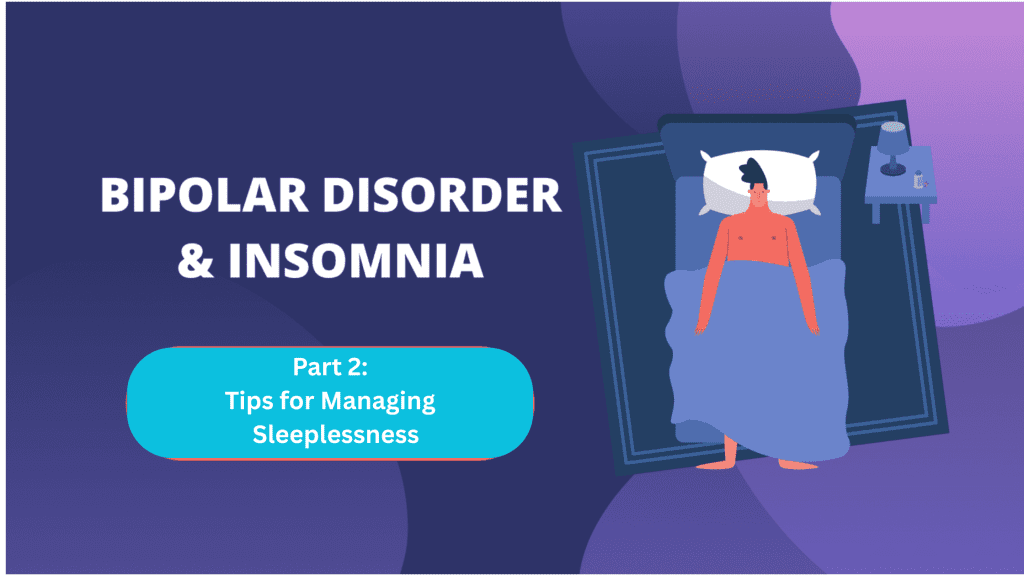Strategies for Managing Sleeplessness

Why is Sleep so Important in Bipolar Disorder?
We’re back to talk about bipolar and insomnia. Previously, we discussed the bidirectional relationship between bipolar disorder and insomnia. Let’s now talk about tips for managing sleeplessness and reclaiming restful sleep.
Sleep is more than just a nightly recharge—it’s a vital component of mental health, especially for individuals living with bipolar disorder. The relationship between bipolar and insomnia is complex but crucial to understand. For those managing this condition, disrupted sleep can have serious consequences, including emotional instability and an increased risk of relapse into manic or depressive episodes.
Research highlights the importance of sleep in mood regulation. Studies show that shorter sleep durations are linked to heightened symptoms such as irritability, anxiety, and depression. For someone with bipolar disorder, these effects can be even more severe. Sleep deprivation doesn’t just leave you feeling tired; it can throw your emotional balance off entirely, making it harder to maintain stability in daily life.
Another challenge is the impact bipolar disorder has on the body’s internal clock, known as the circadian rhythm. This biological system controls sleep-wake cycles and other essential functions. When the circadian rhythm is disrupted, it can make it difficult to maintain consistent sleep patterns. Unfortunately, bipolar disorder itself often disrupts this rhythm, creating a vicious cycle where poor sleep exacerbates mood symptoms, which in turn further disrupts sleep.
For individuals with bipolar disorder, prioritizing sleep isn’t just about feeling rested—it’s a critical part of managing the condition and maintaining emotional health.
For more guidance on bipolar disorder, check out our book and masterclass to reclaim control of your life. You can also check out our free resources.
Tips & Tricks
If you’re dealing with bipolar and insomnia, there are steps you can take to improve your sleep and stabilize your mood. While it may take time and effort to find what works best for you, these strategies can help you build healthier sleep habits and reduce the impact of insomnia on your mental health.
1. Stick to a Routine
Consistency is key when it comes to managing sleep issues related to bipolar disorder. Try going to bed and waking up at the same time every day—even on weekends or days off. This helps regulate your circadian rhythm and reinforces healthy sleep patterns over time.
A predictable routine signals your body when it’s time to wind down for rest and when it’s time to wake up for the day. Over time, this consistency can help reduce insomnia and improve overall mood stability.
2. Practice Good Sleep Hygiene
Sleep hygiene refers to habits that promote better rest at night. Here are some ways to improve yours:
Avoid caffeine in the afternoon or evening, as it can interfere with your ability to fall asleep.
Limit screen time before bed—blue light from phones, tablets, or TVs disrupts melatonin production.
Create a calming bedtime routine that helps you relax before sleeping.
Keep your bedroom quiet, dark, and comfortable by using blackout curtains or white noise machines if necessary.
By improving your sleep environment and habits, you can make it easier for your body to transition into restful sleep each night.
3. Consider Cognitive Behavioral Therapy for Insomnia (CBTI)
CBTI is a specialized form of therapy designed specifically for people struggling with insomnia. This approach teaches techniques like limiting time spent awake in bed and breaking negative associations between your sleeping environment and feelings of frustration or anxiety.
For individuals with bipolar disorder who struggle with insomnia, CBTI can be an effective tool for retraining their minds and bodies to fall asleep more easily. It focuses on practical strategies that address both physical and mental barriers to rest.
4. Monitor Your Mood and Sleep Patterns
Tracking your mood alongside your sleep habits can provide valuable insights into what triggers disruptions in rest—or changes in mood stability. Use a journal or app to record how much you’re sleeping each night and how you’re feeling emotionally throughout the day.
Over time, this information can help you identify patterns or warning signs early on—for example, noticing that reduced sleep often precedes manic episodes or that excessive sleeping correlates with depressive symptoms.
5. Avoid Sleep Deprivation
Sleep deprivation is particularly dangerous for individuals with bipolar disorder because it can trigger manic episodes or worsen depressive symptoms. Even during busy periods of life—like work deadlines or social events—it’s essential to prioritize getting enough rest each night.
If you find yourself losing sleep due to stress or other factors, take steps immediately to address the issue before it spirals into something more serious.
Finally: Eat well, Move well, Commune well. Our previous blog posts have covered these topics in depth; however, they play an integral part in reclaiming your sleep.
The Benefits of Prioritizing Sleep
Improving sleep quality doesn’t just reduce insomnia—it also helps stabilize mood and enhance overall well-being for people living with bipolar disorder. When you get enough rest consistently:
You’re less likely to experience extreme mood swings.
Your energy levels are more balanced throughout the day.
You may find it easier to manage stress or anxiety.
You’ll have better focus and clarity in decision-making.
While managing bipolar and insomnia requires effort and consistency, the rewards are worth it. Better sleep means better emotional health—and a greater ability to live life fully without being held back by mood instability.
Final Thoughts
For individuals living with bipolar disorder, addressing insomnia isn’t just about getting better rest—it’s about safeguarding mental health and reducing the risk of relapse into manic or depressive episodes. The connection between bipolar and insomnia underscores how critical quality sleep is for managing this condition effectively.
By sticking to routines, practicing good sleep hygiene, considering therapies like CBTI, tracking patterns in mood and rest, and avoiding sleep deprivation altogether, you can take meaningful steps toward improving your well-being. While challenges may arise along the way, prioritizing sleep will empower you to live a healthier life—and enjoy greater stability in both mind and body.


